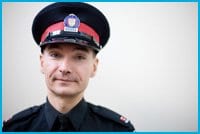Const Tom Decker had planned to be in Iraq by now working as an archeologist. But there’s a war happening so Decker joined the police force instead.
“If you’re an archeologist you won’t be going to Iraq and you won’t be doing much research,” says Decker, who since September has been the Toronto police force’s queer liaison officer. “And you’ve bought a house and you need to pay a mortgage.”
In 2003 the Austrian-born Decker — who moved to Toronto from Australia in 1996 to go to grad school to study ancient near eastern archeology — applied to be a cop.
“I was always interested in all aspects of law and society,” says Decker. “This is what was so interesting about ancient near east studies and the code of Hamurabi.”
Decker decided early on he was going to be open about his sexuality.
“I put in as an openly gay candidate,” he says. “I was married by that point. I put my partner down as my same-sex husband.”
Decker says his training at the Ontario Police College was “interesting at times. The culture is still very male-driven. You find a boy’s club, to a certain extent sexist, very heterosexist atmosphere.
“You find language like, ‘Oh, that’s so gay.’ Standard terms like fag and dyke, you get to hear it all,” he says.
After graduation Decker was assigned to 53 Division in the Yonge and Eglinton area.
“Everyone knew there was this gay officer,” he says. “The staff sergeant took me aside and said, ‘This is your workplace. I want you to feel safe here. But things will happen.'”
Decker says he only had trouble with one veteran officer who didn’t want to work with him.
“I said, ‘Is there anything wrong with the way I do my job?’ He said, ‘No, it’s the lifestyle.’ I said, ‘That shouldn’t be an issue. My being gay is not a lifestyle. It’s who I am,'” he recounts.
Decker says he did end up working with that officer later. “I learned a lot from that person,” he says. Decker then transferred to traffic services.
“I really, really love traffic,” he says. “If you’re in an accident that’s probably the one time you’re glad a cop shows up. It wasn’t an issue being gay. It was fine. But then Pride happened.”
Decker had marched in Pride in full uniform for three years. But in 2007 his traffic sergeant suggested he think again. Decker says the sergeant was only trying to protect him but it made him think twice.
“He said, ‘Not a problem but I’m afraid you’re only going to single yourself out. I want you to be one of the boys.’ He brought up this image of police being in a box together,” he says. “This gentleman saying to a young gay cop, ‘I want you in this box,’ can easily be misconstrued as saying, ‘I want you in the closet.'”
So when Decker was offered the liaison job he accepted. He says it’s a learning experience.
“It’s an opportunity to learn about lesbians, bisexuals, trans people,” he says. “The longer I’m in this position the more I realize I don’t know.”
Decker says relations between queers and police have improved markedly.
“Thirty years ago I have no qualms about saying Toronto police were one of the enemies of our community,” he says. “We’re not the best of buddies but we have learned for the most part to coexist.”
But Decker says incidents like the Pussy Palace raid in 2000 make that peace harder to maintain.
“In a community like ours where it takes years, even decades, to build bridges you have an incident that sets you back years,” he says. “That’s painful not just for the community but for the police service.”
Decker also admits that individual officers do not always respond well to queer complainants.
“The complainant may feel because we’re a gay couple, or a lesbian, the response is not what it should be,” he says. “The complainant may feel victimized a second time.
“I like to hear when things don’t go so well. I can’t say I’ll always be successful but I try to liaise with the division and find an LGBT officer to talk to the complainant.”
Decker says things are improving but cautions that police reflect society.
“You see LGBT personnel advance, not just join but advance,” he says. “But society in general is still to a certain extent homophobic and maybe it’s getting worse. If there is homophobia in society you cannot expect there will be none of it in the police service.”
Decker says queers also need to change.
“You have to get rid of copophobia in the community,” he says. “It’s easier said than done because you want the community to look at the history and not forget what we’ve been through.”


 Why you can trust Xtra
Why you can trust Xtra


